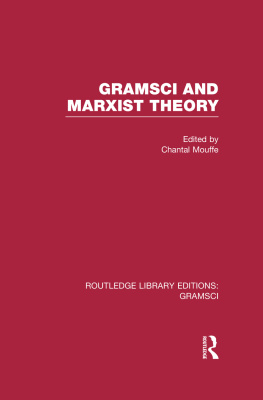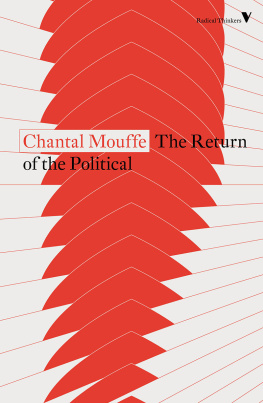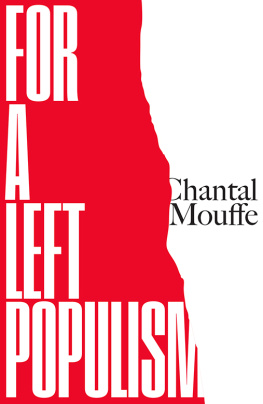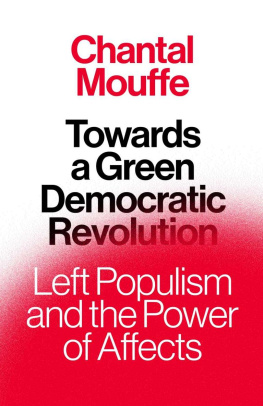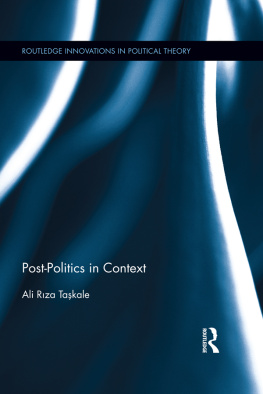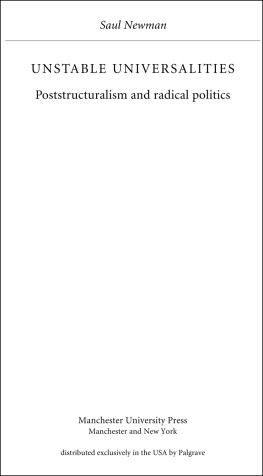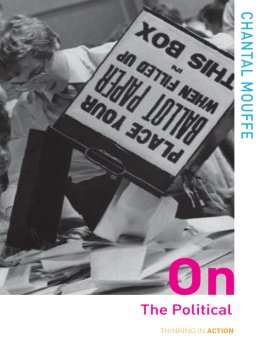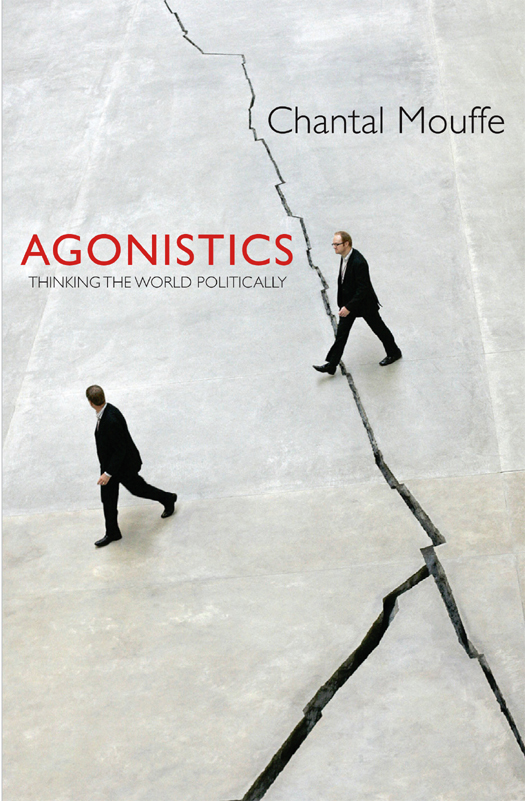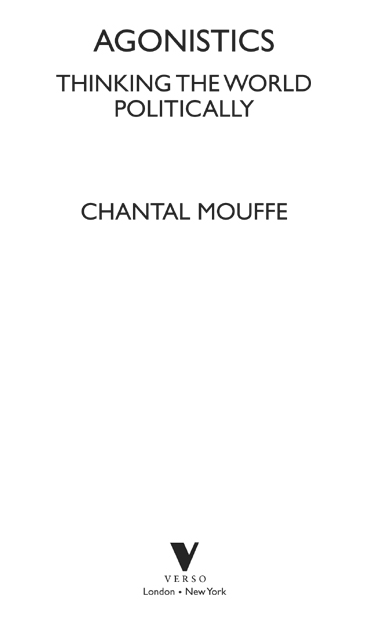First published by Verso 2013
Chantal Mouffe 2013
All rights reserved
The moral rights of the author have been asserted
Verso
UK: 6 Meard Street, London W1F 0EG
US: 20 Jay Street, Suite 1010, Brooklyn, NY 11201
www.versobooks.com
Verso is the imprint of New Left Books
eISBN: 978-1-78168-235-7
British Library Cataloguing in Publication Data
A catalogue record for this book is available from the British Library
Library of Congress Cataloging-in-Publication Data
A catalog record for this book is available from the Library of Congress
v3.1
Opposition is True Friendship
William Blake, The Marriage of Heaven and Hell
Der Feind ist unsere eigene Frage als Gestalt
Theodor Dubler, Hymne an Italien
Contents
Foreword
I have discussed the ideas developed in this book in various places over recent years, and some of them have already been published, but in a different form. Since the objective of these interventions was to present my agonistic approach in diverse contexts and to enquire about its relevance in new areas, I always had to begin by introducing the basic tenets of agonistics, which implied a certain amount of repetition. In editing those pieces for publication, I have tried to eliminate repetition as much as possible, except where it felt necessary for the clarity of the argument. As a consequence, although most chapters relate in one way or another to presentations that I made in public lectures or conferences, none of them reproduce those presentations in their original form. The last chapter has been written especially for this publication.
For those unfamiliar with my approach, at the end of this book I have included an interview I gave some years ago that will help situate the questions discussed in the present volume within the larger context of my work. The interview was conducted for Und jetzt?, an anthology published in 2007 by Suhrkamp, which has kindly allowed it to be reproduced here. By providing a brief introduction to several topics I have been dealing with over the years, I hope this interview will contribute to a better understanding of my current position.
I would like to thank Het beschrijf and Passa Porta, whose invitation to spend a month in Brussels as a writer in residence in May 2012 allowed me to work on the final draft of this manuscript in very pleasant surroundings, with the added bonus of attending the Kustenfestivaldesarts, which provided a great stimulus for my reflections on artistic practices.
Introduction
The essays collected in this volume examine the relevance of the agonistic approach I have elaborated in my previous work for a series of issues that I take to be important to the left-wing project. Each chapter deals with a different question, but in each case my aim is to address the question in a political way. As Ernesto Laclau and I argued in Hegemony and Socialist Strategy, to think politically requires recognizing the ontological dimension of radical negativity. It is because of the existence of a form of negativity that cannot be overcome dialectically that full objectivity can never be reached and that antagonism is an ever present possibility. Society is permeated by contingency and any order is of an hegemonic nature, i.e. it is always the expression of power relations. In the field of politics, this means that the search for a consensus without exclusion and the hope for a perfectly reconciled and harmonious society have to be abandoned. As a result, the emancipatory ideal cannot be formulated in terms of a realization of any form of communism.
The reflections proposed here take their bearings from the critique of rationalism and universalism that I have developed In inscribing the dimension of radical negativity in the political domain, I proposed in that book to distinguish between the political and politics. By the political, I refer to the ontological dimension of antagonism, and by politics I mean the ensemble of practices and institutions whose aim is to organize human coexistence. These practices, however, always operate within a terrain of conflictuality informed by the political.
The key thesis of agonistic pluralism was later elaborated in The Democratic Paradox, where I argued that a central task of democratic politics is to provide the institutions which will permit conflicts to take an agonistic form, where the opponents are not enemies but adversaries among whom exists a conflictual consensus. What I intended to show with this agonistic model was that it was possible, even when starting with the assertion of the ineradicability of antagonism, to envisage a democratic order.
Nonetheless, it is true that political theories that affirm such a thesis usually end up defending an authoritarian order as the only way to keep civil war at bay. This is why most political theorists committed to democracy believe that they have to assert the availability of a rational solution to political conflicts. My argument, however, is that the authoritarian solution is not a necessary logical consequence of such an ontological postulate, and that by distinguishing between antagonism and agonism, it is possible to visualize a form of democracy that does not deny radical negativity.
In recent years, reflecting on worldwide political developments, I have been led to enquire about the possible implications of my approach for international relations. What are the consequences in the international arena of the thesis that every order is an hegemonic one? Does it mean that there is no alternative to the current unipolar world, with all the negative consequences this entails? Undoubtedly, the illusion of a cosmopolitan world beyond hegemony and beyond sovereignty has to be relinquished. But this is not the only solution available, as we can also conceive of another one: a pluralization of hegemonies. In my view, by establishing more equal relations between regional poles, a multipolar approach could be a step towards an agonistic order where conflicts, although they would not disappear, would be less likely to take an antagonistic form.
Another aspect of my reflections concerns the consequences of the hegemonic approach regarding radical projects whose aim is to establish a different social and political order. How can such a new order be brought about? What strategy to follow?
The traditional revolutionary approach has mostly been forsaken, but it is increasingly replaced by another one that, under the name of exodus, reproduces, albeit in a different way, many of its shortcomings. In this book I take issue with the total rejection of representative democracy by those who, instead of aiming at a transformation of the state through an agonistic hegemonic struggle, advocate a strategy of deserting political institutions. Their belief in the availability of an absolute democracy where the multitude would be able to self-organize without any need of the state or political institutions signifies a lack of understanding of what I designate as the political.
To be sure, they question the thesis of a progressive homogenization of the people under the category of the proletariat, while affirming the multiplicity of the multitude. But to acknowledge radical negativity implies recognizing not only that the people is multiple, but that it is also divided. Such a division cannot be overcome; it can only be institutionalized in different ways, some more egalitarian than others. According to this approach, radical politics consists in a diversity of moves in a multiplicity of institutional terrains, so as to construct a different hegemony. It is a war of position whose objective is not the creation of a society beyond hegemony, but a process of radicalizing democracy the construction of more democratic, more egalitarian institutions.


